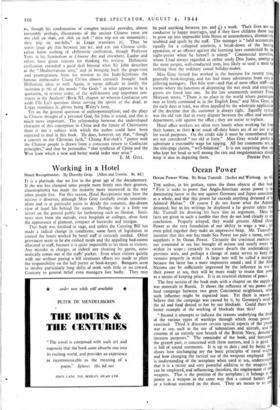Working in a Hotel
Hotel Receptionist. By Dorothy Gray. (Allen and Unwin. 8s. 6d.)
IT is a platitude that we live in the great age of the documentary. If the war has clamped some people more firmly into their grooves, claustrophobia has made the majority more interested in the way other people live. For this reason, Hotel Receptionist may have the success it deserves, although Miss Gray carefully avoids sensation- alism and is at particular pains to deride the romantic, day-dream view of hotel life behind the scenes. Perhaps she is a little too severe on the general public for harbouring such an illusion. Insti- tutes seen from the outside, even hospitals or colleges, often have the appearance of glamour, compact of hierarchy and intrigue.
This book was 'finished in 194o, and unless the Catering Bill has made a radical change in conditions, some form of legislation to control the hours worked by hotel staff is certainly needed. Other grievances seem to be the rushed meals and the appalling bed-rooms allocated to staff, because it is quite impossible to let them to visitors. Any mistake in charges, or indeed any cheating by guests, auto- matically comes out of the staffs' pocket. Even when visitors quietly walk out without paying a bill strenuous efforts are made to plant the responsibility on the hall porter or book-keeper. Banquets seem to involve particularly long shifts of work with little or no reward. Contrary to general belief even managers fare badly. They may
be paid anything between 3os. and £s a week. Their lives are n conducive to happy marriages, and if they have children these tend to grow up into impossible little Neros or neurasthenics, alternatively snubbed and spoilt by the staff. The manager is " held accountabk equally for a collapsed omelette, a break-down of the heating apparatus, or an offence against the licensing laws committed by the night-porter when he himsef is asleep." Commercial travellers, whom Ihad always regarded as rather seedy Don Juans, emerge as the most proper, well-conducted men, less likely to steal a meal for nothing than the ordinary casual holiday-maker.
Miss Gray herself has worked in the business for twenty yea; generally book-keeping, and has had many adventures from rats to pilfering managers. Her bite noir—and that of most office staff—art rooms where the functions of dispensing the wet stock and receiving guests are fused into one. In the late seventeenth century Fyne' Moryson wrote, " There is no place in the world where passengers may so freely command as in the English Inns," and Miss Gray, in the early days at least, was often appalled by the wholesale application of the doctrine that di,: customer is always right. Equally cynical was the old rule that in every dispute between the office and another department, side against the office ; they are easier to replace.
Hotel office workers are often very lonely when working far from their homes, as their Most usual off-duty hours are of nd use at all for social purposes. On the credit side it must be remembered they are not considered " too old at forty." Miss Gray would prefer to substitute a reasonable wage for tipping-. All her comments are, as the title-page claims, "well-balanced." It is not surprising that one who kept her head so well among the rats and megalomaniacs should


























 Previous page
Previous page